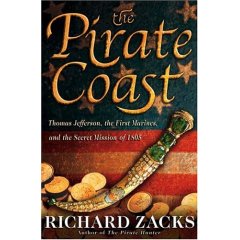December 01, 2005
Gratuitous Llama Sickbed Book Review

The Pirate Coast: Thomas Jefferson, The First Marines and the Secret Mission of 1805, by Richard Zacks.
During my tete-a-tete with Mr. Sinus Infection the past couple days, I've been reading this book, picked up originally on the recommendation of the Pious Agnostic. It tells the story of the United States' dealings with the Barbary Coast pirates, specifically its efforts to gain the release of the crew of the U.S.S. Philadelphia, who were enslaved by the Pasha of Tripoli after she ran aground outside the harbor there. These efforts included negotiation, a show of naval force (including Stephen Decatur's heroic raid to burn the Philadelphia, which had floated free and been captured) and a covert operation by a handful of U.S. Marines under one William Eaton to march across the Libyan desert and attack the Pasha at Tripoli from behind, replacing him with his brother. (Hence the line in the Marine Corp Song Hymn about the "shores of Tripoli".) [Ed. - I have never pretended to have served in the military in any capacity.]
It's a fascinating book, nicely chocked full of contemporary letters and journal entries. Nontheless, I think the author puts some spin on the story that isn't quite warranted. First, he trumps up the young United States' willingness to defy the Barbary pirates in comparison to Europe's craven acceptance of the various Arab beys' and pashas' demand for tribute, routine slave-trafficking and high-seas terrorism. I would point out that up until the beginning of the 19th Century, there probably was not a European navy strong enough to both take on the Muslims and fight off its own European rivals at the same time. It's true, of course, that by 1805, Great Britain was the maritime superpower and, with its forces concentrated, could easily have squashed the entire North African coast. However, at this point, the Brits were stretched to the absolute limit in blockading Napoleonic Europe and protecting their overseas interests. Furthermore, because there were no other bases available in the Med, Britain was dependent on humoring various pashas and beys for critical supplies to maintain her grip on Bonaparte. (This is nicely described in several of Patrick O'Brian's novels, including Treason's Harbor and The Ionian Mission.) Zacks dismisses all of this as "nationalistic rah-rah", which I don't think is a fair characterization. It is also to be noted that once the Napoleonic Wars were good and over, the Brits - along with other European forces - did stomp out the Barbary pirates, something Zacks is forced to admit at the end of the book.
Second, Zacks (and several of the dust-cover critics) site this story as a warning about the dangers of "covert ops", making little tsk, tsk noises about 20th Century CIA comparisons. But the book makes plain that the real fault for the bad side of the outcome (the Senate voted to ratify the treaty without even being aware of a critical secret clause, the American prisoners were ransomed needlessly, the Pasha was bought off and his brother - after committing himself on promises of U.S. military support - was hung out to dry) lies at the feet of appallingly bad diplomacy on the part of the U.S. agent, one Tobias Lear, and Jeffersonian fecklessness. Eaton's brilliant overland raid, coupled with a squadron of heavy frigates in Tripoli Harbor, put the United States in a position to demand Pasha Youssef's own liver had we wanted it. But Jefferson and his agents did not seem to appreciate the strength of such a position or else would not take the responsibility for such muscular diplomacy. Furthermore, they never accepted accountability for the actual fallout.
Indeed, in my opinion, the whole episode actually illustrates very well an old dictum of mine: there is nobody more dangerous to himself and everybody around him than a liberal with a gun. Fear and contempt breed lack of understanding and lack of understanding means you never know when or where the damned thing is going to go off. It also means that if something bad happens as a result, the liberal will usually blame the gun.
Posted by Robert at December 1, 2005 03:05 PM | TrackBackI will add it to the vast list of things I mean to read. Thanks for the recommendation and I hope you feel better soon.
I just picked up the Orientalist. My wife took one look at it when I put it down on the table after taking it out of my bag and I haven't seen it since. I gather its pretty good.
Posted by: RP at December 2, 2005 11:03 AMThanks, and I hope you enjoy it.
Posted by: Robbo the LB at December 2, 2005 03:23 PMThe 'Marine Corps song'? The 'Marine Corps song'?Good God, what are you camels smoking? It is the Marine's Hymn, damnit. Carry on.
Posted by: Alex at December 2, 2005 08:58 PM

 Image courtesy of the lovely and talented
Image courtesy of the lovely and talented 